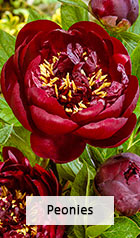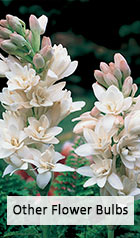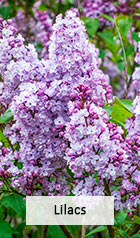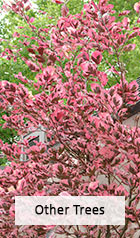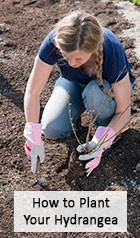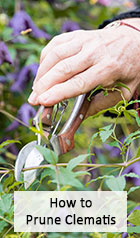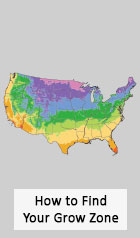- Fall Preview
- Perennials
Close X
Reliable color year after year.
- Bulbs
Close X
Fill your summer with blooms.
- Clematis & Vines
Close X
Provide ambiance and romance.
- Shrubs
Close X
Habitat, color & design possibilities.
- Trees
Close X
A gift for the next generation.
- Patio Orchard
- Fruits
- Tools & Décor
Close X
The right tools make gardening a pleasure.
- Spring Clearance
- Gardening Resources
Close X
Tips and tricks for easy, beautiful gardens.
Deer Resistant Plants

You may see deer as stately creatures, road hazards, cute cartoon characters, or jerky ingredients. However, you'll probably agree that deer make rude dinner guests. If you're planting away from the house, you may want to choose deer resistant plants that are less tempting to deer and other nibblers.
What does deer resistant mean?
We've put together all the plants we sell that deer tend not to bother, the ones that are classified as deer resistant. Animals typically enjoy juicier plants with soft corms or roots and tender greens. With these plants though, the texture may be too rough, the flavor too bitter or the leaves too fragrant; there's something deer don't like about eating them. However, there is no plant that's truly deer resistant. They will eat absolutely anything if food is scarce enough, and some gardeners with bad deer problems find better luck with a high fence than the most aromatic, thorniest plant. But if you're looking to make your garden a little less enticing to hungry deer, featuring plants the best possible deer resistant flowers, perennials, bulbs and more, these are what we suggest:
Top deer resistant plants
Succulents - Most succulents feature a hard exterior, allowing the plants to retain water. This exterior doubles as a protective cover, making it the ideal deer resistant plant.
Grasses and Lilac - Grasses and lilacs are extremely thin plants, which makes them deer resistant in that they just don't provide the tenderness that most animals want.
Coneflowers, Rudbeckia, and Asters - The woodier, less succulent stalks of coneflowers are a turnoff for deer perusing for greens.
Gladiolus - Gladiolus bulbs are extremely tough, which makes these deer resistant flowers unappealing to most nibbling creatures.
Shade plants - Many shade plants prefer acidic soil and produce an acidic taste, making them useful deer resistant plants (although some are also poisonous to pets, so check your plants before allowing your pets to roam your shade garden).
What plants keep deer away?
Deer resistant plants tend to fall into a few categories, based upon their mechanism for protecting themselves from deer. While a hungry deer will graze nearly any plant in the garden, there are certainly families of plants that they prefer, and those that they avoid.
Thorny plants, such as roses or brambles
Deer don't have the luxury of reaching for a knife and fork, so plants with hard or sharp points tend to turn them away. Anything thorny, rough, or tough will deter deer, so roses and evergreens are great deer resistant plants.
Dry or low moisture plants
Deer prefer soft corms and juicy leaves. Plants like coneflower, rudbeckia, lilac, or ornamental grasses have less moisture in their foliage and don't suit a deer's tastes, thus they are less likely to suffer grazing damage from deer.
Hardened plants or hard bulbs
Again, deer prefer not to work too hard to enjoy the flavorful parts from your plants. Gladiolus bulbs or daffodil bulbs are deer resistant, as they're generally hardened on the outside. Small bulbs, like crocus, are also unappealing to deer. Succulents with hard exteriors or thorns are also unlikely to be grazed on.
Plants with strong aromas or tastes
Choose high-acidity plants, like many shade plants, to create a taste that deer will not like. You can also choose varieties with stronger scent, like peonies or bearded iris, to disinvite deer from dinner. Herbs also work well for this purpose, as their strong odors ward off deer and other pesky mammals.
Are there plants that are more deer resistant than others?
Need an easy way to remember which plants are the most deer resistant? Consider which plants offer the least water per bite. Deer get about one-third of their water through their diet, and they love soft and wet plant varieties. Thorny, dry, woody, or rough plants are certainly more deer resistant than juicy, soft plants with big leaves. Deer also tend to avoid plants with heavy odors.
What bedding plants do deer prefer not to eat?
Bedding plants are intended to create a showy visual impact when grouped in a large bunch. Unfortunately, deer find a vast area of low-lying plants to be an invitationto lunch. So, how can gardeners fill seasonal beds with deer-resistant plants?
Choosing bedding plants that deer avoid -- in spring, that means using harder, smaller bulbs that won't produce lush, deer-friendly foliage. Fortunately, using smaller bulbs like gladiolus, daffodil, or crocuses also helps you protect your plants over winter: the same bulbs avoided by deer are also the least favorite of squirrels and other digging creatures.
In summer and fall, your perennials should include hard-edged succulents or relatively dry grasses. Or, try your hand at using ornamental herbs: deer dislike the strong scent of plants like ornamental sage or lilac. Saliva is another ornamental favorite. Anything with a woodier stem, such as lupines, liriope, or coneflower will fill in your flower beds without inviting deer.
If you keep evergreen plants or ones that remain intact for winter interest, choose varieties that aren't popular with deer. In winter, deer tend to be more willing to invade your garden, as food is sparser in their natural habitat. Choose evergreens with prickly needles, and consider winterizing any fruit or ornamental trees that may attract deer with a deer repellant.
You can also choose to plant your garden bed in a shadier spot, and use deer resistant shade plants in your bed. Caladium, begonia, and astilbe all fit the bill.
What annuals are less preferred by deer?
Annuals are the shooting stars of the garden: bright, vibrant, and only available for a short period of time! Nobody wants deer chewing on the annuals that we only get to enjoy for a short time. Deer resistant annuals include plants like snapdragons, nasturtium, cosmos, sweet alyssum, and salvia, which all have flowers grown on woodier stems. Coneflowers, asters, or mums grown as annuals also have woody stems. Most shade-friendly plants are also deer resistant, since shade plants require acidic soil and have an acidic taste, so wax or angel-wing begonias, Persian shields, or caladiums can be good deer-resistant annuals.
Can you make a plant deer resistant?
If you share taste in plants with your woodland friends, gardening can be difficult. However, non-deer resistant plants can be protected from deer using the right tools and planning.
Deploy physical barriers.
If you have an issue with a favorite plant being chewed upon, especially in the winter or spring, use barriers to protect it. Wrap tender trees with a layer of deer or bird netting. Netting works especially well with ornamental shrubs, like hydrangeas, that tend to grow to the right height for deer to snack on. You can also place fencing around areas of your garden that are plagued by deer; just make sure to set the fencing at least eight feet tall to avoid jumpers.
Use deer repellants.
Commercially-available deer repellent can also protect your plants, but you do need to apply it regularly. Most repellants use a combination of bad taste and odor to keep deer away, and often use a variety of vegetable or animal products to achieve that goal. Look for a repellant that is egg-based, or try a garlic-based repellant for a vegan option. Spread around the entire area that you wish to protect, and be sure to reapply as instructed.
Make deer aware of your presence.
Deer are quite easily spooked. They don't want to interact with humans, and will avoid gardens where they feel seen. Some gardeners use motion-activated sprinklers or lighting systems to deter deer. Or, plant your least-deer-resistant plants nearest your home, where human activity is apparent.
Plant non-deer-resistant plants near deer-resistant ones
Nobody wants to visit a buffet full of foods they dislike. Plant your tender plants among harder, less-attractive plants and grasses to make your garden less worth the trip for the deer. Or, plant highly aromatic herbs or perennials near other plants that require deer protection. Sage, lilac, lavender, and peonies are excellent for "making a stink" to deter deer.



